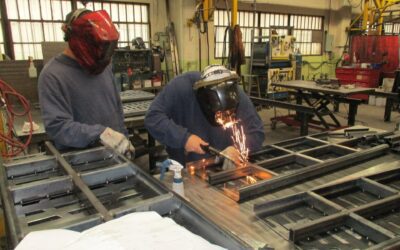Even as the economy rebounds and unemployment drops, the United States faces a skills gap, and particularly so in the manufacturing section. This skills deficit stems from a mismatch – many of today’s job seekers don’t have the competencies needed for today’s high-skill manufacturing jobs.
According to the National Association of Manufacturers’, while nearly 3.5 million manufacturing jobs will likely be needed over the next decade, 2 million are expected to go unfilled due to the skills gap.
For U.S. manufacturing to close the skills gap and maintain its competitiveness, they need to have a confident and objective process to identify prospective employees with certain skills and abilities. Education, government agencies and many research institutions have been promoting skill certifications and credentials as an ‘answer’ to this dilemma.
But the certification and credential world creates a new dilemma – which one to choose, and why?
With the tremendous growth of credentials in this country, it has become more difficult for stakeholders to discern quality credentials from those of lesser caliber. There are an estimated 450 credentials in the manufacturing industry, and of these, many are not recognized by an independent third party. Some educational certificates are housed in accredited institutions, but some programs have not been reviewed to determine whether the certificates are ensuring a valid, fair, and impartial program that qualifies skilled workers.
As for certifications, only a few are accredited by a third party using a validated national or international standard. The absence of credible third-party assessments ensuring the quality of the certificate or certification program creates a buyer-beware environment and leads to confusion by both individuals seeking credentials that will enhance their ability to find employment or further their manufacturing career. Additionally, employers want to know what type and level of knowledge and skill a credential holder has, how it compares to other credential holders, and how much to trust the claims made.
Often, much of the decision-making when selecting a credential is based on the “popularity” of the credential. It is often mistakenly assumed that if a credential is recognized by a third party, used by some manufacturers, and sought by many individuals looking to obtain a credential, then it must be effective in the workplace. But few studies have carefully studied the effectiveness of manufacturing credentials in the workplace and/or if the credentials match the competency requirements of the job.
There have been several surveys conducted about skills certifications and credentials, but the focus has been mainly on their use for training, and most respondents are larger companies, typically HR professionals in fortune 1000 companies. NIST MEP and our network of MEP Centers believe the skills gap issue is real, but the needs of our clients—small and medium sized manufacturers – may be different. Many of our client base may not know what certifications exist, and may not be aware of the how to use them to their benefit in finding and training skilled employees. Employers and job seekers alike are confused about what manufacturing credentials to select since there is a lack of demonstrated value, especially related to future work performance.
To make smart hiring decisions, employers need to know what type and level of knowledge and skill a credential holder has and how it compares to other credential holders, and how much to trust the claims made. At the same time, job seekers want to know which credentials are valued by the employers and lead to obtaining a job; current employees want to know what credentials will help them advance in a lifelong manufacturing career.
Because of the overwhelming choices of credentials and the lack of independent research regarding the quality, market value, and effectiveness of manufacturing credentials, NIST MEP has embarked on a research study, focused specifically on manufacturing skills certifications and credentials. This research will provide an invaluable tool to employers, career counselors, and job seekers.
In addition, it will help to identify how the “skill gaps” could be filled by creating new credentials or replacing existing credentials that are ineffective and not currently relevant. We are seeking input from manufacturing companies to tell us what credentials are being used in their organization, how the credentials are being used and what is the effectiveness of the credential. We are also seeking input from companies that don’t use certifications or credentials and why – do they know what exists, or perhaps they desire a credential that doesn’t exist.
Please help us with this unique research project. Take the Survey
Tell us what is or is not working for you. We will share the results with the manufacturing community later this year.



